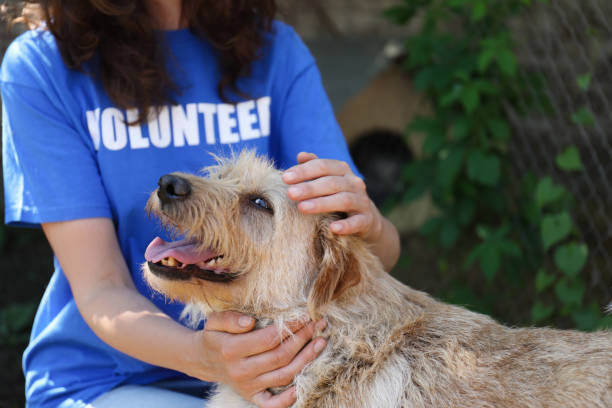Volunteers are an invaluable resource for pet-care businesses, providing much-needed assistance for daily operations and special events.
Whether you run a pet kennel, grooming salon, or dog training business, volunteers can help you achieve your goals and supplement staffing. However, to make the most of volunteer efforts, it's essential to have a clear strategy in place.
Today we'll guide you on how to effectively utilize volunteers at your pet-care business. With this advice, you'll have a volunteer plan together in a pinch!
Define Volunteer Roles and Responsibilities
 Clearly defining roles and responsibilities is the first step in effectively utilizing volunteers. Volunteers need to know what is expected of them to be productive and feel fulfilled. Consider the following steps:
Clearly defining roles and responsibilities is the first step in effectively utilizing volunteers. Volunteers need to know what is expected of them to be productive and feel fulfilled. Consider the following steps:
- Create Specific Job Descriptions: Outline the tasks and duties for each volunteer position. For example, dog walkers, cat socializers, administrative assistants, and event coordinators might all be different volunteer roles.
- Match Skills with Tasks: Understand the skills and interests of your volunteers and match them with appropriate tasks. This ensures that they feel confident in their roles and that their work benefits your business.
Provide Comprehensive Training
Even if volunteers are passionate about animals, they may not be familiar with the specific needs of your business. Comprehensive training is essential to ensure they perform their tasks safely and effectively.
- Orientation Programs: Start with a general orientation that covers your business's mission, values, and key policies.
- Hands-On Training: Provide practical training sessions for specific tasks, such as handling animals, cleaning kennels, or using any relevant software.
- Safety Protocols: Ensure all volunteers are aware of safety procedures, including how to handle animals safely, what to do in emergencies, and proper sanitation practices.
Create a Welcoming Environment
 Creating a welcoming and supportive environment is equally important in keeping volunteers engaged and motivated.
Creating a welcoming and supportive environment is equally important in keeping volunteers engaged and motivated.
Ensure that new volunteers are introduced to your staff and other volunteers, helping them feel like part of the team. Encourage open communication, allowing volunteers to ask questions, provide feedback, and share ideas. Leverage communication platforms like Slack, WhatsApp, or dedicated volunteer apps to keep everyone informed and connected.
Volunteers help your business immensely—they should be appreciated for their work! Acknowledge volunteer contributions through thank-yous, appreciation events, or small rewards to significantly boost morale and foster a sense of belonging.
Set Clear Expectations
Setting clear expectations from the beginning helps prevent misunderstandings and ensures that both your business and the volunteers benefit from the experience.
Be upfront about the time commitment required, whether it’s a few hours a week or specific days each month. Encourage volunteers to communicate if they’re unable to meet these commitments. Beyond time commitments, you should also educate volunteers on your company standards. While volunteers are not employees, they should still adhere to certain standards, such as punctuality, reliability, and appropriate conduct.
Implement regular check-ins or feedback sessions to discuss performance, address any issues, and provide constructive guidance. This feedback can be used as a guide for improving your volunteer program in the future.
Offer Opportunities for Growth
 Recruiting volunteers is your first task; keeping them is the next one. Volunteers are more likely to remain engaged and committed to your pet-care business if personal and professional development opportunities exist.
Recruiting volunteers is your first task; keeping them is the next one. Volunteers are more likely to remain engaged and committed to your pet-care business if personal and professional development opportunities exist.
Providing skill development opportunities can be highly motivating. Offer training in areas like animal behavior, grooming techniques, or event planning to help volunteers expand their knowledge and abilities. For more experienced volunteers, consider assigning leadership roles where they can coordinate other volunteers or lead specific projects.
Additionally, recognizing their achievements with certificates of completion or letters of reference can be invaluable for their resumes and further encourage their continued involvement.
Evaluate and Improve Your Volunteer Program
Regularly evaluating your volunteer program is crucial for ongoing improvement. Collect feedback from volunteers and staff to identify what’s working well and where there’s room for growth.
Surveys and feedback forms can be effective tools for gathering insights from volunteers about their experiences. Additionally, tracking key performance metrics—such as volunteer retention rates, task completion, and overall impact on the business—helps measure success.
Be ready to make adjustments based on the feedback and data collected, whether it involves refining training programs, altering volunteer schedules, or introducing new roles. This commitment to continuous improvement will ensure your volunteer program remains effective and engaging.
 Volunteers can be a tremendous asset to your pet-care business when managed effectively. Remember, a successful volunteer program benefits your business and expands your capacity to help pets and your community. With the right approach, your volunteers can become an integral part of your mission, helping you achieve your goals as a pet-care business.
Volunteers can be a tremendous asset to your pet-care business when managed effectively. Remember, a successful volunteer program benefits your business and expands your capacity to help pets and your community. With the right approach, your volunteers can become an integral part of your mission, helping you achieve your goals as a pet-care business.
Gingr makes managing your pet-care business a walk in the park. Get a demo today!
Subscribe to the Gingr Blog






